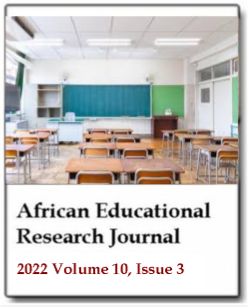The effect of project-based learning approach on student achievement in life science course in primary education
İsmail Kılıç and Melike Özmen UluAfrican Educational Research Journal
Published: September 15 2022
Volume 10, Issue 3
Pages 321-328
DOI: https://doi.org/10.30918/AERJ.103.22.046
Abstract
Within the achievements of life science, a course in primary education; students are expected to have knowledge and skills about cultural heritage elements in their immediate surroundings, family cooperation and solidarity, the Turkish flag and the National Anthem, Atatürk's childhood, cooperation and participation in group activities, natural events and measures to be taken against natural disasters. In line with these achievements, it is aimed to quantitatively investigate the effect of a project-based learning (PjBL) approach on students' academic achievement (AA). This study was carried out with 41 students attending the 2nd grade and taking the life studies course in a primary school in Türkiye. First of all, the unit of "Life in Our Country" was briefly explained as preliminary information on the current curriculum and the AA test prepared by the researcher, which we called the pre-test, was applied to this group of students. Afterward, the project topics prepared by the researcher by the unit gains were given to the students and they were asked to complete these project assignments giving them a certain time. After completing and presenting the given project assignments, the AA test was applied again to the same student group as a post-test. In addition, feedback was received in this process to determine whether the students did their project assignments themselves and from whom they received help. With the help of the data obtained, the student’s AA was calculated according to their support status.
Keywords: Project-based learning approach, primary education, life science course, unit of life in our country, academic achievement.
Full Text PDFThis article is published under the terms of the Creative Commons Attribution License 4.0

